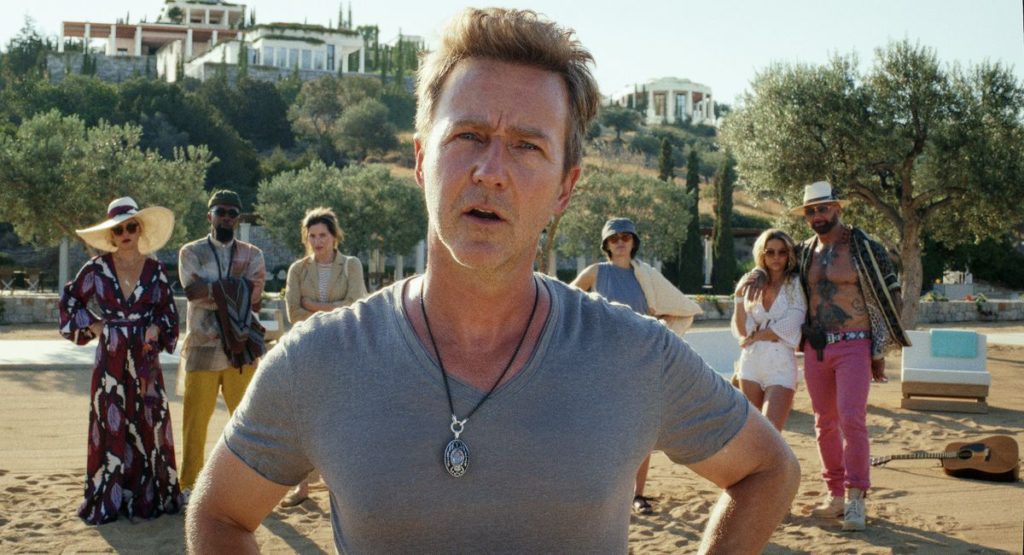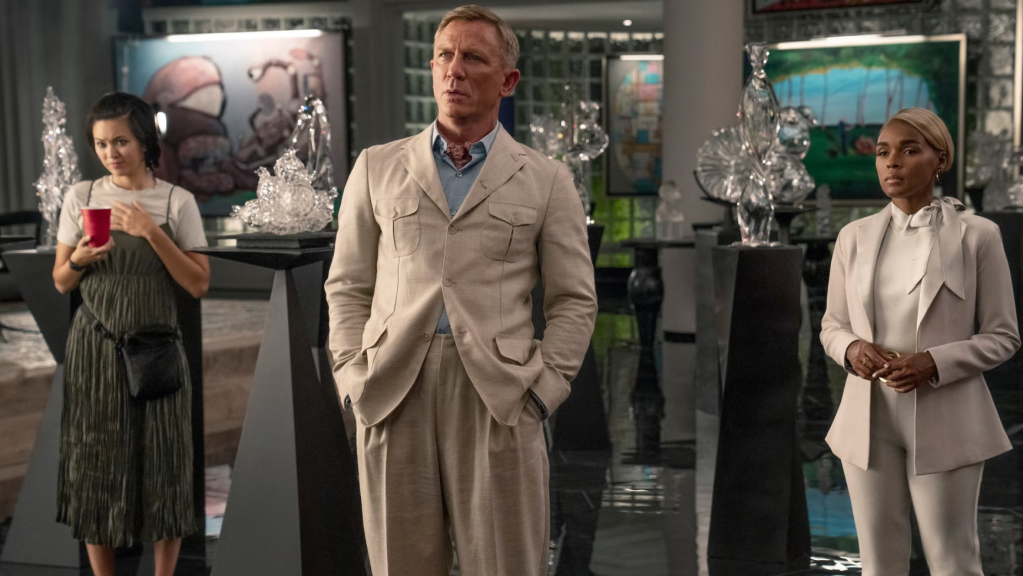Screen adaptations of Agatha Christie mysteries never go out of style. The problem is that they’re so often concerned with literal fidelity that they get bogged down in self-seriousness, so desperate to “update” everything that they veer into the ludicrous. With 2019’s Knives Out, Rian Johnson successfully updated the Christie-style whodunit because he had a deep knowledge of its formula and he played it with a pitch-perfect, kooky sensibility.
For Knives Out’s sequel, the newly released Glass Onion, Johnson does what you should do when Netflix gives you buckets of money to make a whodunit. There are expensive locales and production design, a bevy of great character actors and a twistier murder plot.
Tech billionaire and Silicon Valley demigod Miles Bron (Edward Norton) invites his closest friends, each a power player in their field, to vacation on his private island in Greece. His mansion has a stately pleasure dome, the titular Glass Onion, composed of many layers but transparent at the center.
It’s an apt metaphor for a good mystery, and sure enough Bron has planned a murder mystery game for his guests. Each is supposed to find out who’s “killed” him. But once his meathead friend (men’s rights microcelebrity Duke Cody) is poisoned, there’s a real murderer on the loose, and it seems Miles was the intended target. Luckily, super sleuth Benoit Blanc (a role Daniel Craig reprises with gusto) is on the case.
While Knives Out was about a murder in a family, Glass Onion is a “murder on holiday” mystery. Christie used this formula frequently in novels featuring her own super sleuth, Hercule Poirot. When it’s done right, it indulges in the lifestyles of the rich and famous while also subtly skewering the “haves.” Christie, who came from a wealthy family of good stock that slowly went broke, sometimes looked down on the nouveau riche millionaires in her novels. But she was always adamant that nobody, no matter how wealthy or unpleasant, deserved to be murdered.
The whining and preening Bron is a brilliant adaptation of Christie’s captains of industry. Edward Norton’s grandiose vapidity is spot-on, but it’s hard to feel much sorrow at the idea of him being bumped off.

Fame is as important as fortune in the murder on holiday, and here Johnson cannily updates the formula. Christie’s characters often include celebrities. Athletes, actresses and artists are all vivid personalities who are never quite what they seem and might kill in order to be or stay famous. Johnson creates suspects who are all archetypes of contemporary fame.
Aside from Dave Bautista’s odious but pathetic Cody, there’s also Kathryn Hahn as a governor who’s risen to power by projecting the image of the average suburban mom and Kate Hudson as a dangerously dippy influencer who’s leveraged her past fame as a supermodel into a mass market clothing line. Hudson’s Birdie has a lovely little monologue where she notes how the tables have turned in her relationship with Miles. Once she was the big star and he was the hanger-on; now she must kiss up to him to keep her brand afloat. It’s an encapsulation of the way celebrity has changed over the past twenty years. The talented and not-so-talented need the clout and cash of Silicon Valley overlords in order to succeed.
The work Johnson does to establish these characters and relationships is where the experience of the movie diverges for the whodunit fan and the average viewer. The traditional whodunit devotes a lot of time to introducing characters, and it’s always tempting to do more of this setup on screen, when you’ve got talented actors playing colorful, sometimes campy roles. For those of us familiar with the tropes Johnson uses, these introductions are rich with references and variations on common themes. For those less familiar, it’s too much place setting before getting to the murder. And Johnson doesn’t quite stick the landing with all of these characterizations: if you’ve made a movie where Hahn is only getting about five laughs, something has gone amiss.

Where Johnson makes the best use of his extended run time is in the development and shading of Blanc, his eccentric detective. Blanc is a great riff on Christie’s Poirot: a fastidious, meticulously dressed weirdo with a funny accent, whose strange surface hides a cunning mind and a deep understanding of human nature. Blanc plays a surprisingly serious and authentic role as the film’s moral center. One of the great joys of the film is the naive incredulity with which Blanc views Bron and the trappings of his wealth. Beneath his genial Southern facade, Craig’s expressions show us how Blanc’s attitude toward Bron curdles from befuddlement to contempt.
Glass Onion devotes a great deal of time and feeling to Blanc’s relationship with Cassandra Bland, Bron’s former partner who cut her out of their business. Bland, played with a steely stillness by Janelle Monáe, seeks retribution, and it is up to a rueful Blanc to get her to consider the difference between justice and vengeance and to realize that revealing the truth doesn’t necessarily mean the bad guys will be punished by the law.
Class critique in Glass Onion is far less subtle than in Knives Out, but it is perhaps more interesting for its grandiose cynicism and desperation. While Johnson’s screenplay does a masterful job with red herrings and a bait-and-switch, the actual murder is relatively straightforward. Christie’s murder plots are often diabolical in their simplicity, but this one isn’t. In the end, Blanc is sorely disappointed; the murder has not challenged his mental faculties. And his depression is mutual. If we no longer believe that rich people are capable enough to commit elaborate murders, can the traditional whodunit even survive?
The film’s loopy ending, which veers into an almost action-flick level of violence and special effects, seems to say yes and no simultaneously. Likewise, Glass Onion is both deeply pleasurable and a victim of its own success.





















